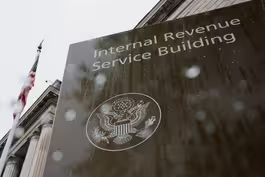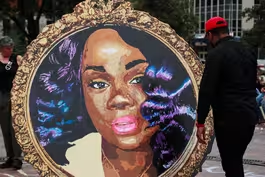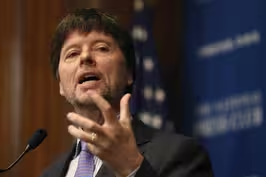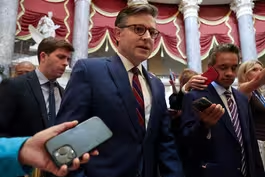
'Dear America' writer describes process to become documented
Clip: 7/17/2025 | 7m 20sVideo has Closed Captions
Jose Antonio Vargas updates 'Dear America' to describe the process to become documented
The Trump administration’s aggressive crackdown on undocumented immigrants is one of the signature pledges of his campaign. However, a series of new polls suggests that public opinion is shifting in response to some of the president’s methods. Ali Rogin spoke with Pulitzer Prize-winning writer Jose Antonio Vargas, whose personal story is tied to the larger questions many are asking.
Problems playing video? | Closed Captioning Feedback
Problems playing video? | Closed Captioning Feedback
Major corporate funding for the PBS News Hour is provided by BDO, BNSF, Consumer Cellular, American Cruise Lines, and Raymond James. Funding for the PBS NewsHour Weekend is provided by...

'Dear America' writer describes process to become documented
Clip: 7/17/2025 | 7m 20sVideo has Closed Captions
The Trump administration’s aggressive crackdown on undocumented immigrants is one of the signature pledges of his campaign. However, a series of new polls suggests that public opinion is shifting in response to some of the president’s methods. Ali Rogin spoke with Pulitzer Prize-winning writer Jose Antonio Vargas, whose personal story is tied to the larger questions many are asking.
Problems playing video? | Closed Captioning Feedback
How to Watch PBS News Hour
PBS News Hour is available to stream on pbs.org and the free PBS App, available on iPhone, Apple TV, Android TV, Android smartphones, Amazon Fire TV, Amazon Fire Tablet, Roku, Samsung Smart TV, and Vizio.
Providing Support for PBS.org
Learn Moreabout PBS online sponsorshipWILLIAM BRANGHAM: While President Trump promised an aggressive approach to immigration, a series of new polls finds public opinion on this issue seems to be shifting.
A Gallup poll found just 30 percent of Americans believe immigration should be reduced.
That's compared to 55 percent last year.
And a new AP poll out today finds just 43 percent of Americans say the president supports -- say they support the president's handling of this issue.
Ali Rogin spoke with one author whose personal story connects to the larger questions many are asking about immigration in America.
ALI ROGIN: Amid the public outcry over President Trump's immigration policies, Pulitzer Prize-winning journalist Jose Antonio Vargas released a new edition of his memoir, "Dear America: Notes of an Undocumented Citizen."
In 2011, he publicly revealed he was an undocumented immigrant and today is once again stepping into the spotlight to tell his story of how he left the U.S. for the first time since he arrived as a child to begin his process of becoming documented.
Here to talk about the questions he struggled with and that millions of others may be coping with now, I'm joined by Jose Antonio Vargas.
Thank you so much for being here with us.
JOSE ANTONIO VARGAS, Author, "Dear America: Notes of an Undocumented Citizen": Thank you for having me.
ALI ROGIN: You have a new edition of your book out.
Why did you decide to write this new edition now?
JOSE ANTONIO VARGAS: I -- this book originally came out during Trump's first presidency.
And, as you just mentioned, I actually had an opportunity last summer to take advantage of a process, of a waiver.
And so for the first time to get documented to follow a process that was not available to me before, I left the country for the first time.
ALI ROGIN: You went to Tijuana because you had to be outside the country.
JOSE ANTONIO VARGAS: I had to be outside the country.
ALI ROGIN: And that was the closest place, right, to have your interview.
JOSE ANTONIO VARGAS: That was the closest place.
And Mexico was the closest place, and hen tried to come back.
So I was at the mercy of the consulate in Tijuana.
So I was there for about six, seven days and then thankfully got approved.
And so now I'm here.
I'm sure everybody knows about the REAL ID Act.
So if I had not gotten this, I would not have been able to get a Real ID.
and I fly all over the country, so not having a Real ID would have been a real problem for me.
ALI ROGIN: Let's take a step back.
Many folks may know that you revealed your immigration status back in 2011, revealing that you yourself are undocumented.
How has your life changed since then?
You have written your memoir.
JOSE ANTONIO VARGAS: Yes.
ALI ROGIN: You're now experiencing living in this country during this moment in the debate about immigration.
JOSE ANTONIO VARGAS: The biggest thing -- I'm a journalist constitutionally since I was 17 years old.
And the thing that I grapple with the most is how immigration is such at the center of our national dialogue, and yet most Americans know very little about immigration as a process and the facts surrounding undocumented people or what we call, this administration, illegal aliens.
So the fact that undocumented people pay taxes and contribute to taxes and have helped keep Social Security solvent, the fact that most states in this country do not let undocumented people drive.
Texas, 1.8 million undocumented people can't drive.
Florida, one million can't drive.
So if we can't drive, how can we vote?
And yet that lie -- never underestimate how a lie can organize people.
And the lies that have been told about undocumented people, the level of myths and disinformation elected a president twice.
ALI ROGIN: And I want to ask you about sentiment which is being shaped by this national dialogue.
JOSE ANTONIO VARGAS: Yes.
ALI ROGIN: Some polls have indicated, including a Gallup poll, that this anti-immigrant sentiment that really has been percolating these few months has begun to die down.
So where do you see it from your perspective?
Has it truly?
JOSE ANTONIO VARGAS: I think what we're seeing is, the public finally understands what ICE does.
So the fact that ICE is picking up farmers, the fact that they're picking up people who are taking care of kids, the fact that we are now are seeing what billions of dollars of immigration enforcement looks like.
And in many ways -- silver lining is not the right phrase for this, but something is happening that for the first time in the 14 years I have been doing this work, I have not seen so many people say, wait, this is not OK. And how many -- what, $140 billion just got passed so that in the next four years ICE can do what it does?
The question now is, as far as I'm concerned, again, having talked to so many Americans in 49 states in the past 14 years, you are the media.
You are in charge of the mis- and dis-information that surrounds you when it comes to this issue.
You are in charge of stepping up, bearing witness.
When someone's getting arrested in front of you, what are you going to do?
And we're seeing that happen, right?
At hospitals, at schools, at farms, we're seeing people step up and say, wait a second, that's my neighbor, that's my classmate, that's my co-worker.
So, in some ways, the Trump administration is breaking this, and it's so broken that finally we can actually ask ourselves, what does a solution look like?
I mean... ALI ROGIN: Well, let's talk about some of those solutions.
You founded an organization called Define American... JOSE ANTONIO VARGAS: Yes.
ALI ROGIN: ... where you're working to reshape the perceptions of undocumented people in media, in literature.
Tell me more about that work and how it's changing those perspectives.
JOSE ANTONIO VARGAS: Again, such a journalistic point of view, which is we can't really debate an issue if we don't have a shared understanding of what the issue is.
What are the facts?
What are the contexts that shape those facts?
And how do we be more responsible?
Look, I'm neither a Republican nor a Democrat.
Again, I have never voted because I'm not allowed to.
But when it comes to this issue, we are not on the same page about what the issue even is.
So our job at Define American is, how do we tell stories that are accurate and they're humane, right?
And I think that's been the big problem, is the inhumanity that in many ways frames what this conversation is.
So that's what we have been doing.
So if you're a Hollywood write who's trying to make a movie or a TV show, if you're a book writer who's publishing a nonfiction book or a fiction book, if you're a playwright and you want to tell an immigrant story, you go to us and we help you make sure that what you're talking about when you're talking about undocumented Indian people or undocumented Black immigrants, that you have all the information that you need so you can do this in an accurate, humane way.
And, in some ways, our own colleagues in journalism have failed.
I have to tell you, whenever I watch the White House press briefings and a White House official says something inaccurate about immigration, I'm watching those White House correspondents.
Why can't they fact-check in real time?
Why can't we actually say, wait a second, that's not accurate.
That's -- some people do it.
But for the most part, we just -- the lies, the misinformation, the disinformation become such oxygen.
It just becomes part of the air.
ALI ROGIN: Jose Antonio Vargas, thank you so much for joining us.
JOSE ANTONIO VARGAS: Thank you so much for having me.
IRS to share personal data with immigration agents
Video has Closed Captions
Clip: 7/17/2025 | 5m 40s | IRS to share personal data with immigration agents to aid deportation efforts (5m 40s)
A look at the stability of Syria's new government
Video has Closed Captions
Clip: 7/17/2025 | 9m 33s | Amid a violent week in Syria, a look at the stability of the new government (9m 33s)
News Wrap: DOJ recommending 1-day sentence for officer
Video has Closed Captions
Clip: 7/17/2025 | 6m 56s | News Wrap: DOJ says officer convicted of killing Breonna Taylor should get 1-day sentence (6m 56s)
Planned Parenthood CEO on blocking it from Medicaid funding
Video has Closed Captions
Clip: 7/17/2025 | 6m 43s | Planned Parenthood CEO says blocking it from Medicaid funding is 'devastating to patients' (6m 43s)
'We will continue': Ken Burns calls PBS cuts shortsighted
Video has Closed Captions
Clip: 7/17/2025 | 7m 41s | Ken Burns calls public media funding cuts 'shortsighted,' but vows 'we will continue' (7m 41s)
What's set to be cut as rescissions package nears approval
Video has Closed Captions
Clip: 7/17/2025 | 8m 8s | The programs facing funding cuts as rescissions package nears final approval (8m 8s)
Providing Support for PBS.org
Learn Moreabout PBS online sponsorshipSupport for PBS provided by:
Major corporate funding for the PBS News Hour is provided by BDO, BNSF, Consumer Cellular, American Cruise Lines, and Raymond James. Funding for the PBS NewsHour Weekend is provided by...

















